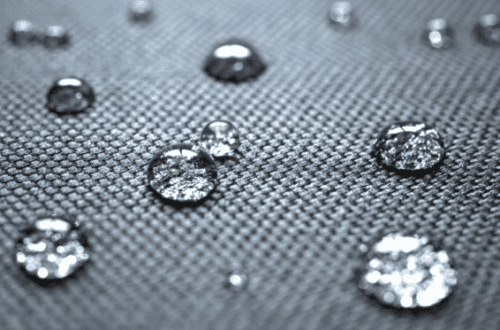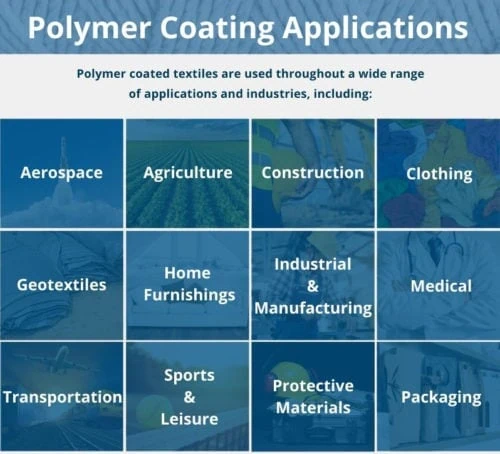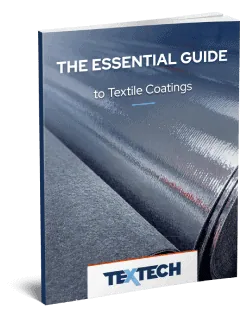The textile industry manufactures products from a wide range of natural and synthesized materials which have typically been derived from one or more of four primary sources: animal, plant, mineral, and synthetic. These textiles are treated and shaped into myriad products, including but not limited to clothing, upholstery, and industrial fabrics.
The addition of polymer coatings in the manufacturing process greatly enhances the value of textile materials by extending their useful life and preserving their aesthetic appearance. Coating methods and technology have evolved alongside the increasingly stringent needs of manufacturers and material scientists.
For example, textile coating technology has begun to incorporate eco-friendly options as manufacturers seek more sustainable and efficient coating solutions. Textile coatings can be custom-designed to provide specific benefits and enhancements that improve the performance of textile products, which makes them useful in a wide range of industries.
Benefits of Polymer Coatings for Improving Textile Performance
Textiles may be subject to a number of external pressures and abrasive elements during everyday use. For this reason, a number of coatings have been developed to reduce the wear of textile materials. Polymer coatings, in particular, offer enhanced protection on the surface of textile products while still allowing for water evaporation through the fabric—a process that is often hindered by other coating materials. Here are the 10 primary benefits of polymer textile coatings:
1. Abrasion Resistance
Abrasion resistance is measured by rubbing flat materials against the fabric in question to determine the rate at which the fabric erodes. Polymer coatings create a layer on top of the textile fabric to add increased resistance to abrasion. It is particularly useful for materials that experience a great deal of friction, such as personal protective equipment (PPE), power transmission belts, backpacks, footwear, and synthetic leather products.
2. Adhesive Qualities
Textile fabrics can be coated with polymers to increase their adhesion and tack to other surfaces or polymers. For this reason, rubber polymer coatings are ideal for use in high-performance vehicle tires, power transmission belts, and seals and gaskets.
3. Air-Holding Capabilities
Polymer-coated textiles can incorporate resistance benefits to stop items like air or water from passing through the material. This makes them particularly useful in products that need to be capable of holding air, this would include items such as SCUBA buoyancy compensators, life vests, airlift bladders, blood pressure cuffs, pressure infusor bags, aerostates, etc.
4. Antimicrobial Properties
Polymers such as chitosan—a naturally occurring biopolymer derived sea creatures—display measurable antibacterial activity, sometimes with a reduction of up to 99%. Since surfaces coated with these materials remain clean and virtually free of bacteria, they are particularly useful in medical textiles, such as bandages, blood pressure cuffs, braces and prosthetics.
5. Flame Resistance
Polymer coatings may be combined with flame-resistant agents to create highly flame-resistant materials, which make them important in the manufacture of protective clothing for firefighters, fabric used in vehicles and airplanes, thermal ablatives for rockets, and safety curtains and carpeting.
6. Durability
Polymer coatings make textiles more sturdy and corrosion-resistant, significantly extending the service life of finished products ranging from household goods like towels and sheets to outdoor camping equipment and outerwear.
7. Noise Abatement
Textiles coated in polymer blends possess sound reduction properties. When sound waves are directed toward the materials, they are absorbed due to its porous nature, thereby preventing the movement of sound. This can be particularly useful in soundproofing layers in automotive, aerospace, and industrial applications.
8. Thermal Resistance
Materials coated with polytetrafluoroethylene (PTFE) or perfluoroalkoxy alkane (PFA) blends are able to withstand temperatures of up to 500° F. Like flame-resistant coatings, these polymer-coated textiles are particularly useful for safety products, automotive and aerospace fabrics, and firefighting apparel.
9. Waterproofing
Polymer coatings provide an excellent means for waterproofing textiles. Their hydrophobic nature ensures that materials coated in certain polymer blends easily repel water and other liquids.
10. Weldability
Polymer coatings may need to be bonded through the use of adhesives, RF, ultrasonic or hot air weldable. These types of fabrics are ideal where a durable sealed seam is required and normally sewn seams create unwanted holes in the surface. These weldable coated textiles are ideal for items such as weatherproof outerwear, inflatable vests, rafts, medical devices, and recreational BC vests.
Polymer Coating Applications
Polymer coated textiles are used throughout a wide range of applications and industries, including:
- Aerospace
- Agriculture
- Construction
- Clothing
- Geotextiles
- Home furnishings
- Industrial and manufacturing
- Medical
- Transportation
- Sports and leisure
- Protective materials
- Packaging
Superior Polymer Coatings From Tex Tech
At Tex Tech, our knowledgeable and experienced specialists possess an exceptional understanding of fabric manufacturing and treatment processes, allowing us to offer a wide range of material processing capabilities. Our advanced equipment can apply multiple coating applications in a single pass using multi-surface and impregnation coating methods. Our film lamination services offer up to 8 films per pass, and we can process materials with widths up to 100 inches. We offer surface enhancements such as embossing and peel ply, and a wide range of custom processing options, including bias shifting, edge treatments, and slitting.
In addition to our extensive experience and wide range of services, we are proud to maintain the following:
- IATF 16949 Quality Registration
- ISO 14001 Certification
- Zero-Landfill Status
- Six Sigma Black Belt Certification
- A2LA Accreditation
For more detailed information on our outstanding textile products and services, download our eBook, “The Essential Guide to Textile Coatings.” Feel free to contact us with any questions you may have about our products or capabilities.



